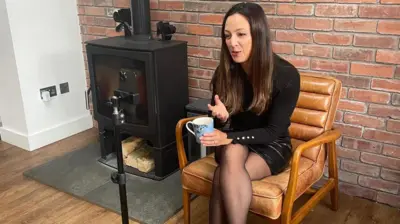We've updated our Privacy and Cookies Policy
We've made some important changes to our Privacy and Cookies Policy and we want you to know what this means for you and your data.
Covid rules: 'We must do everything to protect our patients'
- By Nikki Fox
- Health correspondent, BBC East
Image source, Qays Najm/BBC
All remaining Covid restrictions have been removed in England as part of the government's "Living with Covid" plan. But what does it mean for those working in the health service?
After almost two years of lockdowns, lateral flow testing, mask-wearing and self-isolation, the legal requirements surrounding the coronavirus in England have been lifted.
This is the government's Living with Covid plan, to "transition back to normality".
It means that people who test positive are not legally required to self-isolate and face coverings on public transport are no longer mandatory.
'We are dealing with the clinically vulnerable'
Dr Tim Morton is the chairman of the Norfolk and Waveney Local Medical Committee and a GP partner with Beccles medical centre.
"We're still seeing huge numbers of Covid infections - the pandemic certainly hasn't gone away," he says.
"Over the last few weeks, we've had numerous members of staff off with Covid despite being fully vaccinated. We're dealing with lots of patients in the community with Covid infections."
You might also be interested in:
He says while the vaccines have reduced the severity of Covid generally, GP surgeries were often dealing with the clinically vulnerable.
"For that reason we don't want people who unwittingly come in with Covid symptoms spreading the disease," he says.
"We're asking patients to continue to wear masks not only to reduce infections but as a matter of courtesy to their fellow patients."
He says there remains "huge pressure" on the NHS and its staff.
'It's about making sure patients are safe'
Hannah Woolnough is chairwoman of the Suffolk Local Dental Committee and chairs the British Dental Association's English Council.
"Within dentistry, we're working very closely with people's mouths, we're up very close with their breath, we know that Covid transmits through the air so we've been using additional PPE than before Covid.
"There's lots of subtle changes - but it's all about making sure our patients and staff are safe."
"There have been some adaptations to the restrictions over the period of the pandemic and things are starting to ease off in some areas, but we need to be responsible."
Some precautions, she says, will remain.
"Occasionally things come along that make us re-evaluate the way we do treatment and the way we use out cross-infection control for everyone's benefit, instigated by public health issues. This has been one of those events.
"Everybody needs to access healthcare. If you are a vulnerable person with pre-existing medical conditions, you can make a decision not to go to the supermarket, not to go to restaurant or pub, you can avoid public transport. But you can't avoid going to your hospital or dental appointment."
Rebecca Harris is a full-time carer for her husband, who has mental health issues.
"He needs support from me, his partner, at all times," she says.
"Covid is going to be about for a long time. It's not going anywhere. I'll always wear a mask.
"People ask me why I'm still wearing them. But I've also got a two-year-old who's high risk. I'm not going to put him at risk. Other people might, I won't."
"I think face masks should be implemented for longer, especially in places like hospitals, where most people are wearing masks," says Bill Wendon, 79.
"There's probably about 1% in there without masks which I think is fantastic.
"With people my age we're a bit vulnerable - and it's nice to see people take that care - and I think the health service has done a damn good job."
'Highest bar in healthcare settings'
Image source, Qays Najm/BBC
"There may be a time when those restrictions change and people are not mandated to wear masks - but I still think it's a personal choice," says Nick Hulme, chief executive of Ipswich and Colchester Hospitals.
"We've seen, over the past two years, the lowest numbers of flu infections in years and years.
"I think the heightened understanding of infectious diseases has been really welcome.
"Even if masks are no longer mandated, many people may still chose to wear a mask in healthcare settings."
"We have to have the highest bar for infection in healthcare settings, it needs to be the safest place to be," he says.
"The most vulnerable in our communities will will be our inpatients and our outpatients.
"We must do everything to protect them."
Find BBC News: East of England on Facebook, Instagram and Twitter. If you have a story suggestion email eastofenglandnews@bbc.co.uk
Top Stories
Features & Analysis
Most read
Content is not available








